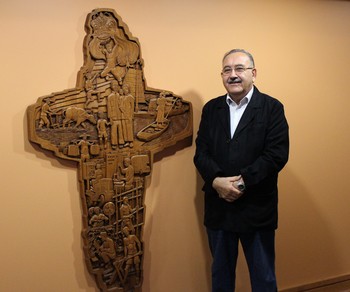Eleven international peacemakers from around the world are visiting congregations, presbyteries and colleges of the Presbyterian Church (U.S.A.) Sept. 27-Oct. 21.
They are sharing their stories about church-based ministries in their countries that seek peace justice and pursue peace in the name of Jesus Christ. This year’s international peacemakers come from Bolivia, Colombia, Iran, Iraq, Israel/Palestine, Jamaica, Madagascar, Niger, Northern Ireland, South Sudan and Syria.
The International Peacemaker program is sponsored by the Presbyterian Peacemaking Program.
Dr. Zuhair Fathallah is an assistant professor of plastic surgery and consulting plastic surgeon at Basrah Teaching Hospital, a councilmember and a lay pastor in the National Evangelical Presbyterian Church (NEPC).
He will be visiting Northwestern College and the presbyteries of Prospect Hill and National Capital.
What is the situation in your country that you will be addressing?
The problem of politics — countries in the Middle East are fighting for survival. So many Christians are leaving Iraq that we don’t know if Christianity will exist in the next generation.
In my church in Basrah (southern Iraq) we Presbyterians are working through our difference with Muslims and other Christian denominations because of our different thinking. Orthodox church leaders don’t understand why priests don’t govern us. Muslim people tolerate us as long as our mission work doesn’t cross the line of handing out Bibles or trying to convert someone.
How are the faith communities trying to address this situation?
There are two things I want to mention. We (NEPC) have a kindergarten of more than 250 children — 99 percent are Muslim. It is Christian, we teach God values, but we don’t share Christ. All of our children learn manners, how to be have, to be loyal to their country. We sing, ‘God is love.’
NEPC also partners with a Baptist church that runs a Christian radio station in the nation’s capital, Baghdad. We are in a Muslim majority country, yet federal and local gave us an operating license in Basrah — how we got it is a mystery. It is God’s will.
The station plays hymns, has Bible readings and time for people to call in for prayer. Pastors pray for mostly Muslims. We know this because many call in using nicknames so they can’t be identified.
What lessons from your situation are you trying to communicate to U.S. Presbyterians?
Some Muslim people are accepting Jesus — they are having conversion experiences in their heart. But they can’t make it clear they are Christians because of persecution.
Christian television stations have satellite channels here, and we get an excellent response from Muslims. They are familiar with Christianity, they are asking for books to help them understand more. They are almost like an underground church.
What is the primary message you want to communicate to U.S. Presbyterians?
The largest Presbyterian church in Iraq had 350 families before the wars (Iraqi-Iranian, Gulf War I, Gulf War II) started in 1988. They have 15 now. I was lay pastor in my church in Basrah for nine years (2004-2013) because we couldn’t afford a pastor.
Please pray for us and for those Muslim who are coming to know Jesus. To officially convert to Christianity would be a death sentence for them, so we continue to teach God’s love and tolerance for all.

